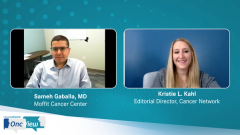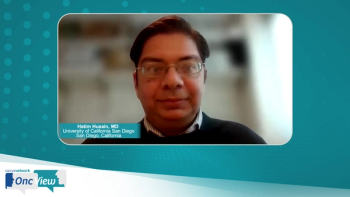
Third-Line Therapy in Follicular Lymphoma
Sameh Gaballa, MD, considers therapeutic options in the third-line setting and beyond for patients who relapse.
Episodes in this series

Kristie L. Kahl:What percentage of patients relapse to the third-line setting and beyond?
Sameh Gaballa, MD: As I mentioned, ultimately most patients would. If they live long enough, they ultimately would progress. The disease is not cured with whatever you’re using. Obviously, if someone is diagnosed at age 70 and died from a natural cause at age 80, they’ve been through only 2 lines. They’re not going to see third line. You have to live long enough to eventually get to the third-line setting, but most patients would relapse. There are those who have very long remission duration, and those are the patients who probably may not see a third-line setting. But if patients live long enough, they will ultimately get to the third line.
Now what’s the percentage that I roughly see in clinic and what’s the breakdown of patients in the clinic first line, second line, third line, and beyond? I’m in an academic center, so I get referrals for a lot of the relapse/refractory diseases. It’s going to be a little skewed more toward third line and beyond. In my practice, it’s probably 50/50. Maybe 50% of patients will have third line and beyond, and the other 50% are going to be first or second line.
Kristie L. Kahl: What are the treatments that are available for the third-line setting right now?
Sameh Gaballa, MD: As I mentioned, the third-line setting is rapidly changing. We’ve had several approvals within the last year. Last year we got tazemetostat, which is an EZH2 inhibitor. We’ve traditionally had PI3-kinase inhibitors, so we have idelalisib, copanlisib, and duvelisib. This year, we had umbralisib approved, which is another PI3-kinase inhibitor with a better safety profile compared with the previous PI3-kinase inhibitors.
Most recently, CAR [chimeric antigen receptor] T-cell therapy was approved—I think a few weeks ago—in the third line and beyond. We have more options now. Traditionally, there have been allogeneic transplants and autologous transplants, but as I mentioned, with all these newer options available, transplant is becoming less commonly used in these patients.
Kristie L. Kahl: Are treatment considerations for the third-line setting and beyond the same as the second-line setting?
Sameh Gaballa, MD: For the treatment considerations in the third-line setting, absolutely. If you have a younger patient with a good social support system and possibly a high-risk disease, meaning they keep on relapsing quickly, their remissions don’t last that long. If they have a high–FLIPI [Follicular Lymphoma International Prognostic Index] score, then this would be like a perfect candidate for CAR T if they have access to it. However, if this is an older patient with comorbidities, someone who does not have social support, does not have access to CAR T, or lives far away, it is patient preference. Sometimes they think CAR T is too aggressive, and then other treatments are considered. You could use PI3-kinase inhibitors, or tazemetostat. Obviously, PI3-kinase inhibitors will have some associated toxicities. You have to put that in line as well and make sure these patients are taking their prophylaxis: PCP [pneumocystis pneumonia] or shingles prophylaxis. You may consider doing CMV [cytomegalovirus] monitoring at some point. There’s also the EZH2-mutational status. If they’re EZH2 mutant, then they’re going to be expected to have very good responses to tazemetostat, which has a good safety profile. But if they’re a wild type, then you may look at all the options in front of you and decide which would fit your patient.
Transcript edited for clarity.
Newsletter
Stay up to date on recent advances in the multidisciplinary approach to cancer.




































